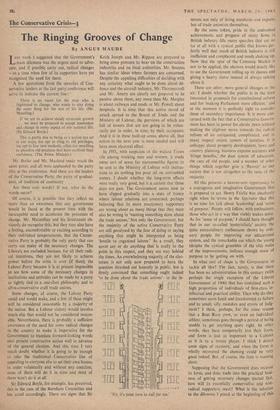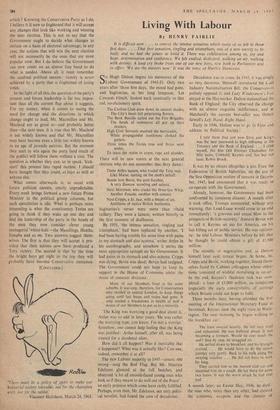The Conservative Crisis-3
The Ringing Grooves of Change
By ANGUS MAUDE Asr week I suggested that the Government's I main dilemma was the urgent need to advo- cate, and if possible carry out, radical changes —at a time when few of its supporters have yet recognised the need for them.
A few quotations from the speeches of Con- servative leaders at the last party conference will serve to indicate the current line: There is no room for the man who is frightened to change, who wants to stay doing the same thing for the rest of his life. (Mr. Maudling.)
If we are to achieve steady economic growth , • . we must be prepared to accept innovation and change in every aspect of our national life. (Sir Edward Boyle.)
This is partly due to being as a nation too set in our ways, too apt to cling to old privileges, too apt to fear new methods, often too unwilling to abandon old practices that have outlived their usefulness. (The Prime Minister.) Mr. Butler and Mr. Macleod made much the same point, and all were applauded by the party elite at the conference. And these are the leaders of the Conservative Party, the party of gradual- ness, of tradition of continuity .
Are these only words? If not, what do the words mean?
Of course, it is possible that they reflect no more than an awareness that any government would be faced at the present time with the inescapable need to accelerate the processes of change. Mr. Macmillan and his lieutenants ob- viously do recognise this; but they may also have a feeling, uncomfortable or exciting according to their individual temperaments, that the Conser- vative Party is probably the only party that can carry out many of the necessary changes. The Liberals are excluded because, for all their radi- cal intentions, they are not likely to achieve power before the crisis is over (if then); the Labour Party because it is at present impossible to see how some of the necessary changes in institutions and attitudes can be made by a party so tightly tied to a one-class philosophy and to ultra-conservative craft trade unions.
Some changes, of course, the Labour Party could and would make, and a few of these might well be considered reasonable by a majority of the nation. But a Labour victory would involve much else that would not be considered reason- able. Nevertheless, there is probably a sufficient awareness of the need for some radical changes in the country to make it imperative for the Government to translate forward-looking words into present constructive action well in advance of the general election. And this time I very much doubt whether it is going to be enough to take the traditional Conservative line of appealing to everyone else to set their own houses in order voluntarily and without any coercion; none of them will do it in time and most of them won't do it at all.
Sir Edward Boyle, for example, has perceived, this in the case of the Burnham Committee and has acted accordingly. There are signs that Sir Keith Joseph and Mr. Rippon are prepared to bring some pressure to bear on the construction industries and on local authorities. Mr. Soames has similar ideas where farmers are concerned. Despite the appalling difficulties of deciding with any certainty what ought to be done about de- fence and the aircraft industry, Mr. Thorneycroft and Mr. Amery are clearly not prepared to be passive about them, any more than Mr. Marples is about railways and roads or Mr. Powell about hospitals. It is time that this active mood of attack spread to the Board of Trade and the Ministry of Labour, the purviews of which are full of houses that are not going to be volun- tarily put in order, in time, by their occupants. And it is in these built-up areas, above all, that action in the next year is most needed and will have most electoral effect.
In 1951, with suspicion of the wicked Tories rife among working men and women, it made some sort of sense for statesmanlike figures to be sent to the Ministry of Labour with instruc- tions to do nothing but pour oil on untroubled waters, I doubt whether the long-term effects were really very good, but it is certain that those days are past. The Government seems now to have slipped gradually into .a state of trance where labour relations are concerned, perhaps believing that its more reactionary supporters are wrong about so many things that they must also be wrong in 'wanting something done about the trade unions.' Not only the Government, but the majority of the active Conservative Party are still paralysed by the fear of doing or saying anything that might be interpreted as being `hostile to organised labour.' As a result, they never say or do anything that is really to the point in this respect, and they are way behind the times. An overwhelming majority, of the elec- torate is not only now prepared to have the question thrashed out honestly in public, but is firmly convinced that something ought indeed `to be done about the trade unions'—in the in- `No, it's your. turn to call for me.' terests not only of living standards and exports, but of trade unionists themselves.
By the same token, pride in the undoubted achievements and progress of many firms in British industry fills many speeches that cut no ice at all with a cynical public that knows per- fectly well that much of British industry is still inefficient and complacent and needs shaking up. Now that the spur of the Common Market is not to be applied, the electors would dearly like to see the Government rolling up its sleeves and giving a hearty shove instead of always talking about it.
There are other, more general changes in the air. I doubt whether the public is in the least interested in proposals for constitutional reform and for 'making Parliament more efficient,' and at the moment it is perfectly right to consider these of secondary importance. It is more con- cerned with the fact that a Conservative Govern- ment has been in power for eleven years without making the slightest move towards the radical reform of an antiquated, complicated, and in many respect unjust, system of taxation. It is unhappy about property development, town and country planning, business expense accounts and `fringe benefits,' the dual system of education, the care of old people, and a number of other things which together give a 'flavour' to our society that is not altogether to the taste of the majority.
All this presents a heaven-sent opportunity to a courageous and imaginative Government that is prepared to act. Henry Fairlie was absolutely right when he wrote in the Spectator that this is no time for talk about 'leadership' and 'sense of purpose. People will follow, with enthusiasm, those who act in a way that visibly makes sense. As for 'sense of purpose,' I should have thought that in our so-called 'materialistic' society the quite extraordinary enthusiasm shown by ordi- nary people for improving our educational system, and the remarkable use which the young (despite the cynical grumbles of the old) make of the improvements, indicate enough' sense of purpose to be getting on with.
In what sort of shape is the Government to tackle all this? The fact, surely, is that there has been no administration in this century (with perhaps the single exception of the Liberal Government of 1906) that has contained such a high proportion of individuals of first-class in- tellectual and practical ability. Then why do they sometimes seem fated and foredoomed to failure and to small, silly mistakes and errors of judg- ment? I think, perhaps, for the same reason that a Boat Race crew, or even an individual athlete, sometimes goes through a period of being unable to get anything quite right. In other words, they have temporarily lost their form, and form is just as important to a Cabinet as it is to a tennis player. I think I detect some signs of recovery, and when the form is wholly recovered the showing could be very good indeed. But, of course, the time is running short.
Supposing that the Government does recover its form, and does wade into the practical busi- ness of getting necessary changes started fast, how will its essentially conservative and non- radical supporters react? What is the solution to the dilemma I posed at the beginning of this article? Knowing the Conservative Party as I do, I believe it it now so frightened that it will accept any changes that look like working and winning the next election. This is not to say that the Government ought to decide what changes to initiate on a basis of electoral advantage; in any case, the actions that will win the next election will not necessarily be the ones that are most popular now. But .I do believe the Government can now count on an almost free hand to do what is needed. Above all, it must remember the cardinal political maxim : victory is never achieved by a party that is frightened of losing votes.
In the light of all this, the question of the party's present and future leadership is far less impor- tant than all the current flap about it suggests. For my money, when it comes to seeing the need for change and the directions in which change ought to lead, Mr. Macmillan and Mr. Macleod are as good as—and probably better than—the next men. It is true that Mr. Macleod is not widely known and that Mr. Macmillan may have become even a little too widely known in an age of juvenile satirists. But the moment they start to win again the party (and much of the public) will follow them without a care. The question is whether they can, so to speak, 'kick- start' this process into rapid motion. I should have thought that they could, at least as well as anyone else.
What comes afterwards is, as usual with future political careers, utterly unpredictable, Every week brings forward a new future Prime Minister in the political gossip columns, but such speculation is idle. What is perhaps more interesting is what the constituency Tories are going to think if they wake up one day and find the leadership of the party in the hands of the men they now consider clever young managerial 'whizz-kids.—the Maudlings, Heaths, Josephs and so on. Two answers suggest them- selves. The first is that they will accept it pro- vided that their actions now have produced a Tory victory. The second is that by the time the bright boys get right to the top they will probably have become Conservative statesmen.
[CONCLUDED.] 'There must be a policy of sport to make our Industrial society tolerable, not for the champion only. but for the rabbit.'
--Viscount Hailsharn, March 24, 1963.















































 Previous page
Previous page